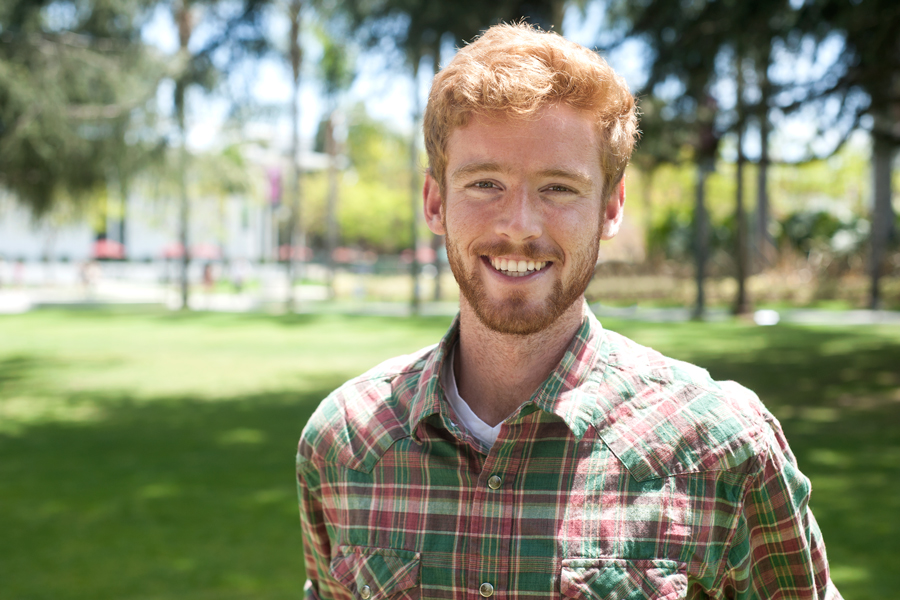Danny Gibson’s track and cross country career comes to a close on Saturday when he graduates from Loyola Marymount University, but now he plans to share the lessons he’s learned as student-athlete at LMU as a teacher and coach.
As one of nearly 400 student-athletes at LMU, the senior computer science major from Bellingham, Washington, says his time on the Lions track and cross country teams taught him how to live up to his ability, improve himself consistently and be grateful. Starting this summer, Danny will pass on the wisdom learned at LMU when he heads to Tulsa, Oklahoma, where he’ll teach high school math for Teach for America.
As part of the ‘10 for 15‘ series, freshman Nathalie Rubin asked 10 questions to 10 seniors from the Class of 2015 who were involved in Student Affairs. Here’s what Danny had to say about his experience as a student-athlete.
Why did you choose to come to Loyola Marymount University?
I’m a transfer from the University of Washington, so I was looking for a different experience than that. LMU stood out from the other schools because of its location, the Jesuit tradition and my family’s history here. Coach G [Scott Guerrero] was generous and that really helped me and my parents in my decision to come here.
How has being a student-athlete affected your experience at LMU?
Being a student-athlete has no doubt been the dominant aspect of my LMU experience. Practice and competition shape my schedule. I wouldn’t have it any other way, though. Running is a socially and spiritually fulfilling experience for me. So no matter what is going on in the rest of my life, I always turn to my training as a project that I can have close to total control over. Without that outlet, I almost certainly wouldn’t be graduating from college.
What is your favorite memory from being a student-athlete?
Winning the Bronco Invite in 2013 is a favorite memory. We were running without our fastest runner, and beat our regional rival UC Santa Barbara by two points. Coach gave one of his only pre-races speeches — “If everyone runs what they’re capable of, we can win.” And we did. Nobody had to be a hero. Everyone just acted to their ability. And I think that’s a good microcosm of teamwork in action.
Who at LMU has inspired you?
I get a lot of inspiration from my non-athlete friends — especially people within my major. There’s a very dynamic group of people in the Computer Science division, and they work really hard to understand many difficult topics. Speaking as someone that got kind of caught up on the athletics side of things, I have so much admiration for my friends’ commitment to their studies.
What is an important lesson you have learned as a student-athlete at LMU?
I learned a lot about team dynamics and how they can change over time. Personally, coming in as a transfer and being naturally introverted, I spent two years happily occupying an outsider niche. This year, because there is so much youth on the team, I started to think more actively about mentorship roles — what I can impart to the younger guys and vice versa.
What is something most people don’t know about being a student-athlete that you’d like them to know?
I’m always trying to dispel “jock” stereotypes. Not that many LMU student-athletes sit all day and watch SportsCenter. The fastest 5k runner on the team has a full academic ride — same as the school 10k record holder did. I’d submit that the most successful athletes are trying to find greatness in whatever they do, so they don’t really engage in the things that people might believe student-athletes love.
What other organizations/programs have you been involved in at LMU?
I volunteer as a sacristan for Campus Ministry, and I also work as a teaching assistant for the Computer Science division. I’ve learned the value of steady commitment from my involvement. As a sacristan, the faith community is counting on your presence for the service to go smoothly, and as a TA, students have the rightful expectation that someone will be on duty to answer questions. Neither job requires special heroics, just showing up and doing your best on a regular basis.
What are your plans after you graduate and how will your experiences as a student-athlete and with other campus involvements at LMU benefit you?
I’m joining Teach For America-Oklahoma, and will be teaching high school math in Tulsa. I plan to do a bit of coaching, so my student-athlete experience will definitely benefit that.
I think the student-athlete experience is about consistent and incremental improvements — big breakthroughs are extremely rare. I’m going to take that same approach to whatever I do, and that’s particularly important in the context of Teach for America, where kids really deserve a teacher that can be a stabilizing force academically.
What advice do you have for current and future LMU student-athletes?
Coach G has a short set of rules for the cross country and track teams, and the most important rule is “Be Grateful.” That’s the best advice to all the student-athletes. The athletes that embrace the idea make the most of the opportunities here at LMU, are more fulfilled, and compete well for a place that they’re grateful for. It’s actually a pretty hard rule to follow all the time, but it provides a good mantra. Just thinking about being grateful can help you in the times that you don’t necessarily feel that way.
What will you miss the most about Loyola Marymount University?
I’m going to miss the experience of developing team culture and chemistry. I have a lot of optimism about the future of the team (and LMU), and it’s tough to move away at what could be a tipping point. But I think I’ve put in my work, and know that it’s also a good time to be a fan.
By Nathalie Rubin
